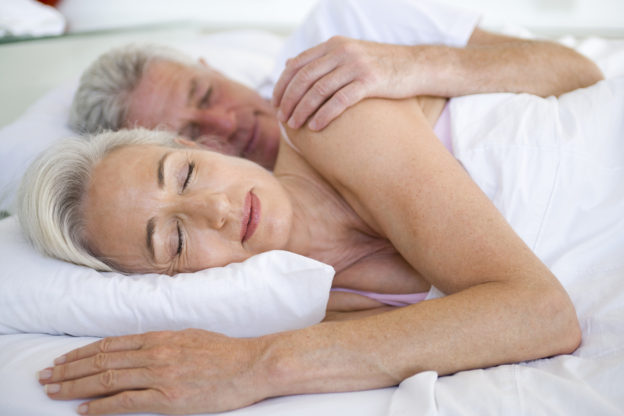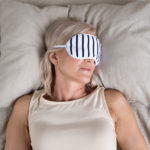By David Blyweiss, M.D., Advanced Natural Wellness
May 11, 2018
- A good night’s sleep may protect against Alzheimer’s
- Here’s what happens to your brain while you sleep
- Snooze your way to a sharper mind
You know how important a good night’s sleep is. If you get less than seven or eight hours, you wake up groggy. It throws your whole day out of whack… making it hard to concentrate and focus in on anything.
And when it comes to your good health, sleep is just as important as diet and exercise. It lowers your chances of an early death, protects against diabetes and heart disease. It even helps you to maintain a healthy weight and helps protect against premature aging.
Regularly getting a restful night’s sleep is also critical for your brain health. Especially when it comes to the prevention of… dementia and Alzheimer’s disease.
In particular, a full night of uninterrupted sleep can actually reduce beta amyloid levels in your brain.
This is the protein that clumps together and forms plaques between the nerve cells, where they disrupt the connectivity of neurons. And they’re strongly associated with the development of Alzheimer’s disease.
Open your arteries, improve blood flow for a new health miracle...
Did you know your circulatory system has over 60,000 miles of arteries, veins and other blood vessels, if stretched end to end?
But as you age, your blood vessels undergo changes, which may cause them to stiffen, thicken and get clogged.
GOOD NEWS! Doctors have now identified a “Miracle Molecule” inside your arteries that helps OPEN your arteries and IMPROVE blood flow.
It’s what Dr. Valentin Fuster calls it, "One of the most important discoveries in the history of cardiovascular medicine."To you, that means...
- Healthy blood pressure
- Sharper mind and memory
- Skyrocketing energy and muscular strength
- Increased pleasure and passion in the bedroom
- Improved circulation to every cell and organ in your body
Go here to discover a new natural way to significantly boost the levels of this miracle molecule in YOUR body NOW!
So the idea that a good night’s sleep can slash levels of beta amyloid by as much as 6% is great news. Just imagine how sharp your brain would be if you could sleep like a baby every night!
How a Good Night’s Sleep Helps Protect against Alzheimer’s
When you go to sleep at night, amazing things happen.
In particular, your brain has a “drainage” system (the glymphatic system) that flips on when you fall asleep. Once it’s activated, large amounts of space (the ventricular highways) open up between the cells of your brain. This allows cerebrospinal fluid to rush between brain cells and pick up toxic waste products.
This process flushes all the garbage accumulated during the day out of your brain, including beta amyloid. All of this “trash” is then delivered to the liver where it’s broken down for disposal.
But when you wake up at any time during the night this process immediately turns its self off. Waste starts accumulating again.
This makes it very important to get a good night’s sleep whenever you can.
The World's Quickest Solution for Ending Prostate and Urinary Misery
This has recently been revealed to be one of the only real breakthroughs in prostate health.
The seeds of a strange fruit (sometimes called "Chinese Apples") hold powerful phytonutrients that are a revolution in prostate health.
In fact, UCLA and Veterans Administration research have now proved this to be true.
Not only that, but it may be the worlds quickest solution for ending prostate misery.
Simply stated, these phytonutrients represent a huge step beyond beta sitosterol, saw palmetto, and other phytosterols alone.
Simply click HERE if you want to have fast prostate relief...restful, uninterrupted sleep...no more constant "urges to go"...enhanced virility...and optimal prostate support for life.
Snooze Your Way to a Sharper Mind
Now I know that everyone has a restless night every now and then. And some people have them more often than not.
However, there are many things you can do to train yourself to sleep better. It just involves a bit of dedication on your part, and the ability to follow through.
Set your sleep and wake times as close to the same time every night/every morning. Once you establish these parameters, take the following steps to ensure a good night’s sleep.
Make your bedroom a sleep-friendly environment. The room should be cool and well ventilated. If you look up the optimal temperature for sleeping you’ll be surprised…65 degrees Fahrenheit! An extra blanket is ok. Make sure to shut down all electronic devices and dim the lights about an hour before bedtime to create a quiet atmosphere.
Avoid caffeinated or sugary beverages after lunchtime. You may think you’re immune to their stimulating effects… but that’s just wishful thinking.
Stop watching the TV, Computer, iPad and mobile phone an hour before bedtime. Their screen light interferes with your ability to fall asleep and get to the sleep stages you need.
If you don’t fall asleep within about 20 minutes don’t make the mistake of getting up and engaging in mentally or physically challenging activities. And please don’t flip the TV on or start messing with your tablet or smartphone. All of those activities will only make you more alert. Instead pick up a book, listen to music or simply spend the time meditating.
If brain chatter keeps your mind racing when you hit the hay, try L-theanine. It promotes calmness by increasing alpha activity in the brain. This results in “relaxed alertness.” And, when your mind is calm, you can get to sleep a lot faster. Start at 50-100 mg shortly before bedtime. Within a few days, go to 200 mg.
If you tend to wake up in the middle of the night, I recommend a combination of valerian and hops. Valerian is a well-researched sleep herb that works just as well as a prescription sleeping aid, but does it naturally. When you combine valerian (500 mg) with hops (120 mg), it can improve both your quality of sleep and the amount of time you spend in deep sleep.
If you’re having a hard time re-setting your natural sleep cycle, take 1-3 mg. of melatonin about an hour before bedtime. If you’re new to taking melatonin, begin at 1 mg. and build up to 3 mg.
Seek the sunshine when you wake up. Open the blinds and curtains. Sit outside while you sip on your tea or coffee. Enjoy breakfast on the patio. The sooner you seek light in the morning, the more effect it will have on your sleeping patterns, promoting normal melatonin production at nighttime.
Remember that magnesium you should be taking? Try half your daily dose just before bedtime for extra relaxation.
SOURCES:
Ooms S, et al. Effect of 1 night of total sleep deprivation on cerebrospinal fluid β-amyloid 42 in healthy middle-aged men: a randomized clinical trial. JAMA Neurol. 2014 Aug;71(8):971-7.
Nobre AC, et al, L-theanine, a natural constituent in tea, and its effect on mental state. Asia Pac J Clin Nutr. 2008;17(Suppl 1):167-8
Koetter U. et al, A randomized, double blind, placebo-controlled, prospective clinical study to demonstrate clinical efficacy of a fixed valerian hops extract combination (Ze 91019) in patients suffering from non-organic sleep disorder. Phytother Res. Sep 2007;21(9):847-51.
Zhdanova IV, et al, Sleep-inducing effects of low doses of melatonin ingested in the evening. Clinical Pharmacology & Therapeutics. 1995;57: 552-558.







